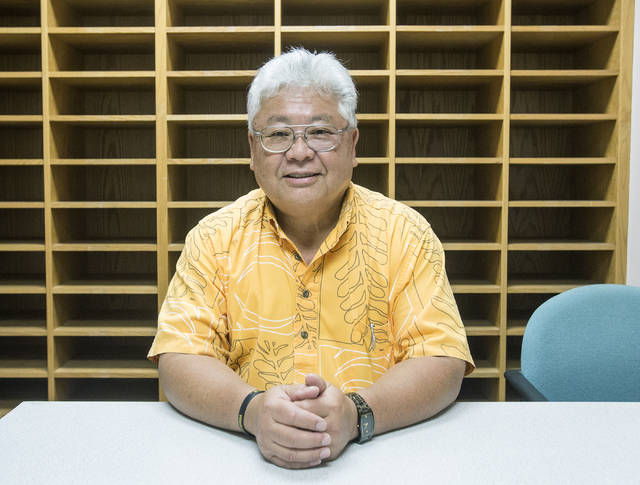Editor’s note: This is one of a series of intermittent stories about contests in the Aug. 11 primary election.
The biggest threat to state Rep. Richard Onishi’s incumbency this election is in the form of a kindergarten teacher from Pahala.
Raina Whiting is Onishi’s only Democratic opponent in the House District 3 race, and whose name will appear on a ballot for only the second time.
Whiting previously ran for County Council District 6 in 2016, when she received 32 percent of the vote, losing to Councilwoman Maile David.
Before running for office, Whiting met independent Vermont U.S. Sen. Bernie Sanders in 2016. Sanders, who ran for president that year on a broadly popular social Democrat platform, was a primary source of inspiration for Whiting.
“He asked me what I wanted to do. I said I wanted to run for office, and he said, ‘That’s exactly what people your age should be doing!’” Whiting said.
To that end, the 30-year-old Whiting said she is running to fix what she sees as disjointed representation for the district — “I felt that our community’s representation was centered on Oahu,” Whiting said.
Whiting said she represents a “new school” approach to politics that she thinks more people prefer: a representative who connects directly with community members to directly address their concerns.
“The question I ask at every single door is, ‘What issues matter to you?’” she said. “Every answer’s different.”
Although every community in the district has its own needs with their own solutions, Whiting explained that her broad focus is in making sure every Hawaii family has access to services such as housing, medical care and education.
Whiting also raised the issue of the Kilauea eruption, calling it “a huge issue, one that’s touching on other issues like homelessness.” Whiting was impressed by the efforts of the county as well as District 4 state Rep. Joy Buenaventura and District 2 state Sen. Russell Ruderman to address the recovery from the disaster, but emphasized that the county and state need to be accountable for “finding equity” for those impacted by the eruption.
Much of Whiting’s political inspirations are drawn from the 2016 Sanders campaign, where the Vermont senator vocally criticized politicians who rely on campaign donations from corporate interests.
“Most of my donations come from gifts of $100 or less from community members,” Whiting said. “I’d rather receive donations from a person pledging money because they’re inspired by what I’m saying.”
Whiting also was openly critical of Onishi, who she called an “old school” politician.
Onishi, Whiting said, no longer represents the will of the citizens because he has taken donations from Monsanto — the former agricultural corporation that now operates under the brand of pharmaceutical multinational Bayer and donated $1,000 to Onishi’s campaign in 2017 and 2018.
“I simply don’t believe that his donations don’t influence his policy,” Whiting said.
“Changing who or what politicians are — that’s important to me,” she continued. “We can’t continue to have politicians that no longer reflect the values and needs of the community.”
Whiting has struck at Onishi before. She accused him of avoiding engaging with his constituency after he failed to appear at a candidate forum in late June.
“I was going to be on the mainland during the event, and I asked if they could reschedule,” Onishi said.
Onishi said his own political record proves that he has no reason to avoid confrontation with a neophyte such as Whiting. Instead, he highlighted his own accomplishments and promised more if re-elected.
The 64-year-old Onishi was first elected to House District 3 in 2012, after working as a computer systems analyst for the county for more than 20 years.
Since his election, Onishi said one of his primary concerns has been reducing the state’s dependency on imported food from the mainland or elsewhere. As vice chairman of the House Agricultural Committee for four years, Onishi said he worked to support small farmers and ranchers and increase local food production.
If re-elected, Onishi hopes to return to the agricultural committee and develop a statewide agricultural plan to solidify the state’s agricultural independence.
Likewise, Onishi is chairman of the House Tourism Committee, which is involved in “every facet of the state’s economy,” Onishi said. He hopes to remain tourism chairman if re-elected and establish a “leadership role” for the Big Island in the state’s tourism industry.
Regarding the Kilauea eruption, Onishi said he would support a special session of the state Legislature to address the disaster, should the situation require, but thinks Hawaii County is handling the affair well.
Onishi also clarified his involvement in a controversial bill last year that raised the transient accommodations tax in order to pay for a rail project in Honolulu. Onishi voted yes on the bill, which some criticized for levying taxes on multiple islands to pay for an Oahu project.
“When you look at the TAT, the impact on local communities is minimal,” Onishi said. “The majority ends up being paid by visitors at hotels.”
Onishi said it takes an experienced politician to balance the needs of different sectors to better the community and the state.
“I have a lot of experience trying to improve my community, and I understand county government,” Onishi said. “I’ve gotten a lot done as state representative.”
House District 3 includes Pahala, Volcano, Mountain View, Kurtistown, Keaau and other parts of Puna and Hilo.
Email Michael Brestovansky at mbrestovansky@hawaiitribune-herald.com.








